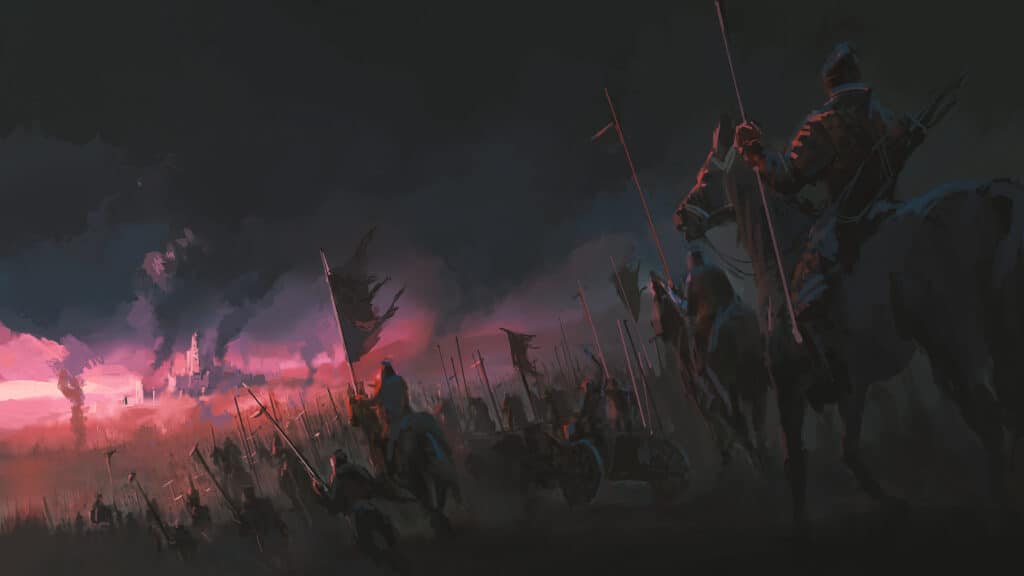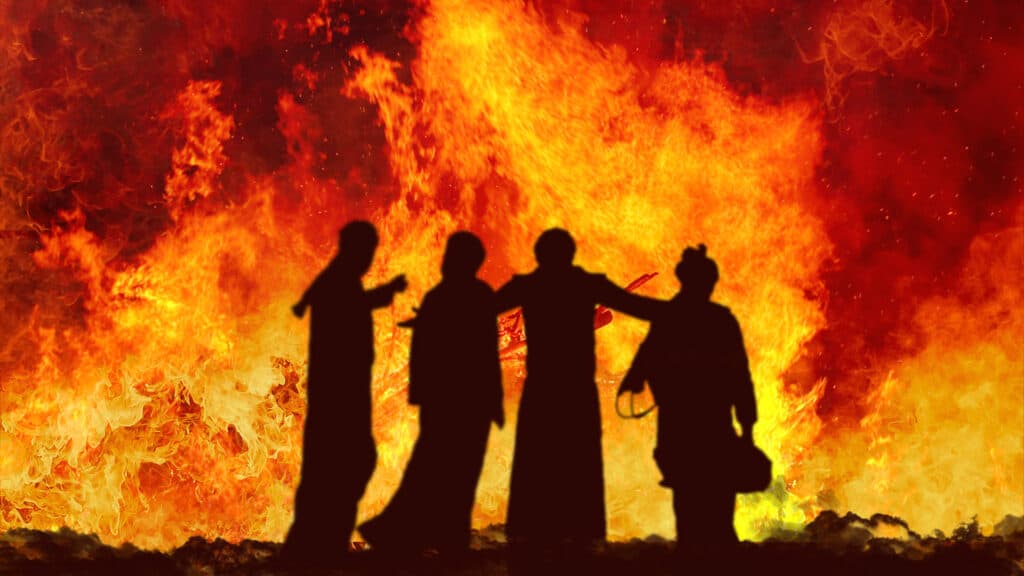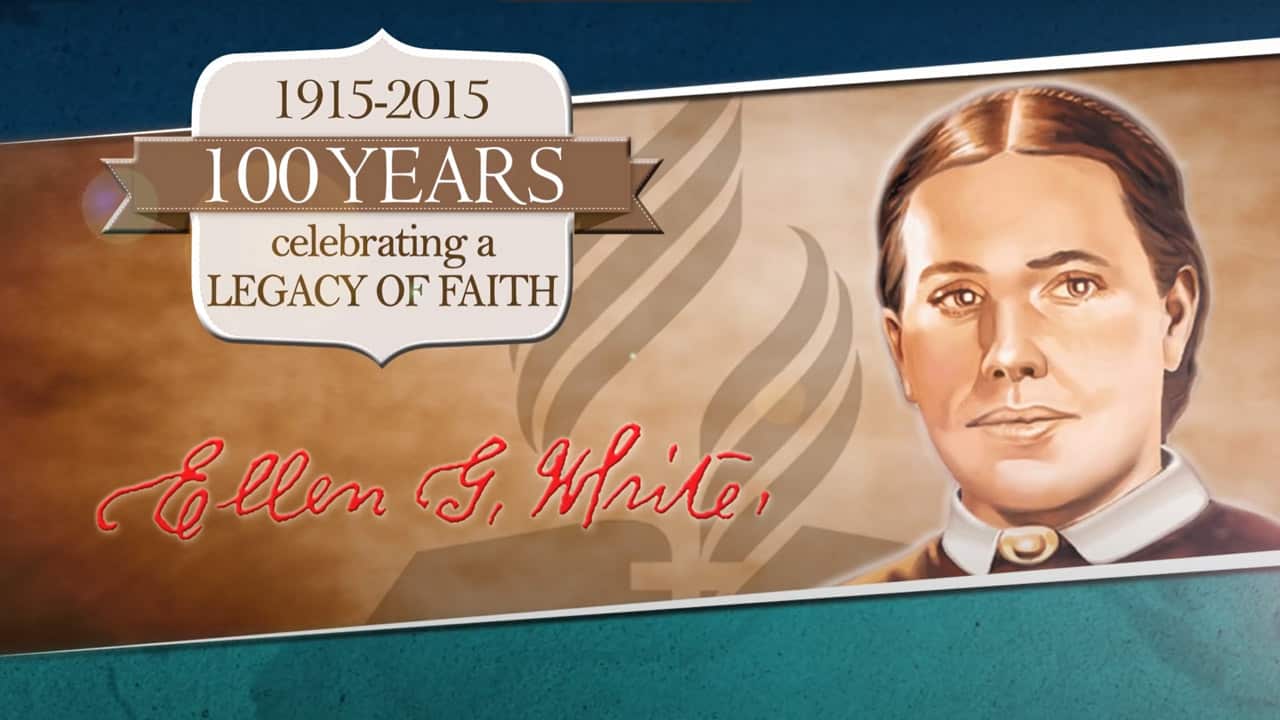Is there more to what is happening today than meets the eye? Are the forces of evil battling the forces of good all over the fate of our souls?
The Bible describes humanity’s collective situation, in which evil forces are indeed at work behind the scenes, causing chaos and creating confusion (Ephesians 6:12). Thankfully, there are also good forces at work (God), offering compassion, wisdom, understanding, and guidance (Galatians 5:22-26; James 1:5; John 16:13).
But why does this war rage on, even today? And why does it feel like we’re caught in the middle, having to constantly make choices between what’s good or bad and which path we will follow?
In many of her writings, Adventist author and church co-founder Ellen White shares helpful insight about this spiritual battle. Referring to this as the Great Controversy, she shows how the Bible proclaims God’s ultimate victory. And when all is said and done, she counsels how following Christ and His Word is the only way we can share in His victory over evil and eventually be redeemed.
We’ll tackle this heavy subject piece by piece:
- An invisible war with visible consequences
- Why was there war in heaven?
- How did the war come to Earth?
- Why did Jesus have to die?
- How does Jesus’ death redeem us?
- How has this conflict continued throughout post-biblical history?
- How did the Gospel spread around the world, despite persecution?
- What are the “End Times,” and what do they look like?
- What are the signs that the “End Times” are near?
- What is our part in the Great Controversy?
- Will there be an end to this war? And to evil in general?
These are heavy questions, and they’ve been asked over and over by many people. But Ellen White didn’t shy away from these tough topics. She knew it was important for her fellow Christians to know about what’s really going on, so she encouraged them to learn what the Bible really says.
The Bible describes an invisible war—with visible consequences
There are many instances in Scripture where this spiritual battle is referenced. As various questions or situations arose in the early history of Seventh-day Adventism, Ellen White took time to discuss these Bible stories and the principles within them.
Elisha and the Heavenly Army
In the Old Testament, an army surrounded the city where the prophet Elisha was staying. This army had come to capture him. As Elisha’s assistant looked out at the huge army, he started to panic.

“My master!” he exclaimed, “what shall we do?” (2 Kings 6:15, NKJV).
Elisha simply said, “Do not fear. Those who are with us are more than those who are with them” (2 Kings 6:16, NKJV).
As the young man looked around him, he had no idea what Elisha meant. How were there more with them than the entire army approaching?
Elisha prayed, “Lord, I pray, open his eyes that he may see.” Elisha’s prayer was answered. The young man got a glimpse of what the prophet had been able to see all along. “The mountain was full of horses and chariots of fire” (2 Kings 6:17, NKJV).
God had an unseen army protecting Elisha. And Ellen White wanted to make sure that was fully understood:
“Between the servant of God and the hosts of armed foemen was an encircling band of heavenly angels. They had come down in mighty power, not to destroy, not to exact homage, but to encamp round about and minister to the Lord’s weak and helpless ones.”((White, Ellen G., Prophets and Kings, p. 256 ))
And throughout Scripture there are even more stories, promises, and warnings about the unseen world.
The Three Hebrew Captives
Three young people (Shadrach, Meshach, and Abednego) refused to worship the image of King Nebuchadnezzar. He had them thrown into a furnace burning so hot, the guards who stood too close to the flames collapsed.

Moments later, he said, “Look! I see four men loose, walking in the midst of the fire; and they are not hurt, and the form of the fourth is like the Son of God” (Daniel 3:25, NKJV).
Nebuchadnezzar’s eyes were opened to see the Divine presence.
So Ellen White wanted to make special note that “…Nebuchadnezzar called forth the servants of God, and they had not so much as the smell of fire upon them. … If you are called to go through the fiery furnace for Christ’s sake, Jesus will be at your side.”((White, Ellen G., Our High Calling, p. 358 ))
We can also find this echoed in the Psalms.
“He shall give His angels charge over you,” reads Psalm 91:11-12. They will “keep you in all your ways. In their hands they shall bear you up, lest you dash your foot against a stone” (NKJV).
She felt that this promise of God was worth emphasis, and as we claim it, our faith can grow:
God commissions His angels to save His chosen ones from calamity, to guard them from “the pestilence that walketh in darkness,” and “the destruction that wasteth at noonday.” Again and again have angels talked with men as a man speaketh with a friend, and led them to places of security.((White, Ellen G., Acts of the Apostles, p. 153 ))
The Apostle Paul cautions us in Ephesians 6:12, “For we do not wrestle against flesh and blood, but against principalities, against powers, against the rulers of the darkness of this age, against spiritual hosts of wickedness in the heavenly places” (NKJV).
This is what Ellen White was speaking to when she wrote that the “Christian life is a warfare. … In this conflict of righteousness against unrighteousness. We can be successful only by divine aid.”((White, Ellen G., Messages to Young People, p. 55))
The conflict between good and evil is very real. It began before the creation of man. The root of evil and sin began in the most perfect of places—Heaven. But we can call upon God to guide us through our daily battles.
Why Was There War in Heaven?
The dragon of Revelation, also referred to as the Devil or Satan, was once a gloriously exalted angel. He was known by a different name—Lucifer.

As Lucifer observed God, he imagined himself in that position. And instead of being grateful for his place of responsibility, he coveted a higher rank. His jealousy led him to be dissatisfied with God and His government. Ultimately, this led him to reject God’s leadership and break God’s law.
“War broke out in heaven,” Revelation 12:7-9 tells us. In these verses, we read of the clash between Michael the archangel and heaven’s angels, and the “Dragon” and the angels that defected to his side.
Angels were engaged in the battle; Satan wished to conquer the Son of God and those who were submissive to His will. But the good and true angels prevailed, and Satan, with his followers, was driven from heaven.((White, Ellen G., Early Writings, p. 145 ))
Ellen White wanted to emphasize that God is the ultimate victor. And even though a heated battle began long ago, we need not worry about how things will end.
Looking closer at the character of Lucifer, the book of Isaiah says, “How you are fallen from heaven, O Lucifer, son of the morning!” (Isaiah 14:12, NKJV, emphasis added).
Lucifer, expressing his quest for higher position, declared, “‘I will exalt my throne above the stars of Heaven,’ he said to himself, ‘I will be like the most High’” (Isaiah 14:14, NKJV).
But how do you explain the beginning of sin in a perfect place?
Some things are beyond our human comprehension, and Ellen White was not afraid to assert that “it is impossible to explain the origin of sin so as to give a reason for its existence.”((White, Ellen G., The Great Controversy, p. 492 ))
We can, however, understand what sin is. And that there is always freedom of choice. 1 John 3:4 describes sin as “transgression of the law” (KJV) or “lawlessness” (NASB). And God’s commandments are a law of love, toward God and others.
So sin is a violation of perfect love. His motivation for giving the law to men and angels was to preserve their happiness and peace. Anything that goes against this law instead exalts self over love, in one way or another, thus going against everything God wants for humanity.
And because of God’s love, as Lucifer began his opposition, God was patient with him. Instead of immediately destroying him, God let him rebel. He allowed him to choose his path.
In great mercy, according to His divine character, God bore long with Lucifer. The spirit of discontent and disaffection had never before been known in heaven. It was a new element, strange, mysterious, unaccountable.((White, Ellen G., Patriarchs and Prophets, p. 38 ))
But why was God so patient? Why didn’t God just wipe Lucifer out? Why would He allow sin to gain a foothold in a perfect world?
The answer to this question says a lot about God’s character and His rulership. “If you love Me,” He says, “keep My commandments” (John 14:15, NKJV).
God wants obedience that springs from a heart of love. He will never force us to follow Him, and that includes letting us see what a choice against Him looks like.

The theme of freedom of choice is one Ellen White wrote about extensively.
God desires from all His creatures the service of love—homage that springs from an intelligent appreciation of His character. He takes no pleasure in a forced allegiance, and to all He grants freedom of will, that they may render Him voluntary service.((White, Ellen G., The Great Controversy, p. 493 ))
Imagine if He had immediately destroyed Lucifer. Imagine the feelings of the remaining angels. They’d think, “If I don’t do exactly what God wants, He’ll destroy me too!” And so, instead of serving God from love, they would serve Him out of fear.
In 1 John 4:18 it tells us, “Perfect love casts out fear” (NKJV). It makes perfect sense for our Creator to want our allegiance. But He values our freedom even more. He only wants our allegiance if it’s real—because we love Him. He wants us to follow His way from an understanding heart, not a heart of fear. He offers us the best, but the final choice is ours.
The final outcome of Lucifer’s rebellion was war. Paraphrasing Revelation 12:7-9, Ellen White wrote about this in The Signs of the Times, a ministry periodical that covered theological topics frequently discussed within the growing Seventh-day Adventist denomination at the time.
Then there was war in heaven. The Son of God, the Prince of heaven, and His loyal angels engaged in conflict with the arch rebel and those who united with him. The Son of God and true, loyal angels prevailed; and Satan and his sympathizers were expelled from heaven.((White, Ellen G., The Signs of the Times, Article B, paragraph 10, January 9, 1879 ))
How did the war between good and evil come to Earth?
In the first chapters of Genesis, we read the history of the beginning of the world. Adam and Eve were given a garden home. Every need they had was satisfied by a loving Creator.

“When Adam and Eve were placed in the beautiful garden,” Ellen White writes, “they had everything for their happiness which they could desire.”((White, Ellen G., The Spirit of Prophecy, vol. 1, p. 27 ))
God gave special instructions about the trees in the garden. He invited Adam and Eve to eat from every tree in the garden except for one.
“From any tree of the garden you may freely eat; but from the tree of the knowledge of good and evil you shall not eat, for on the day that you eat from it you will certainly die” (Genesis 2:16-17, NASB).
While God would not totally remove the choice to experience evil, He made it as easy as He could for Adam and Eve to follow His instruction.
God would not permit Satan to follow the holy pair with continual temptations. He could have access to them only at the tree of knowledge of good and evil.((Ibid., p. 34 ))
She found it significant that the devil was not allowed to hound their every step. He could only access them from the one place in the garden that involved a choice.
If Adam and Eve avoided that tree, they would continue to enjoy their perfect garden home. They’d never have to know what evil was like.
But the unknown can be one of the greatest temptations. Especially when an opportunity is presented to find out what’s there.
The devil knew this, which is why he waited until they came near.
He called to Eve with a pleasant but inquisitive voice.
“Has God indeed said, ‘You shall not eat of every tree of the garden’?” (Genesis 3:1, NKJV).
She looked up to see a serpent in the forbidden tree. Instead of ignoring the question and distancing herself, Eve chose to have a conversation.

“We may eat the fruit of the trees of the garden;” she said, “but of the fruit of the tree which is in the midst of the garden, God has said, ‘You shall not eat it, nor shall you touch it, lest you die’” (Genesis 3:2, 3, NKJV).
“You will not surely die,” came the cunning reply. “For God knows that in the day you eat of it your eyes will be opened, and you will be like God, knowing good and evil” (Genesis 3:4-5, NKJV).
Eve’s interest was aroused. She held it in her hand. She took a bite. I’m still alive, she probably thought. And I feel just fine…
She showed the fruit to Adam and told him of her experience. He, too, ate the fruit. Then they may have begun to wonder in what way they just became “like God.”
What’s interesting is that until this experience, Adam and Eve had completely trusted God. They had no reason to doubt Him.
They also hadn’t ever come across anything that was contrary to God’s words, His nature, or His ways. Not until this situation.
It must have felt strange to come across conflicting information, especially about their Creator! This was the first time they were presented with a true choice between right and wrong.

Regarding the tree, someone wasn’t telling the truth. Either God was lying, and eating from the tree really was ok (even beneficial!), or the Serpent was lying and trying to get them to go against their Creator.
Satan often mixes truth with a lie. It makes the lie more believable. And Ellen White felt it necessary to caution humanity about this tactic of the devil. Regarding Satan’s words to Eve, she wrote:
The words of Satan, “Your eyes shall be opened,” proved to be true in this sense only: After Adam and Eve had disobeyed God, their eyes were opened to discern their folly; they did know evil, and they tasted the bitter fruit of transgression.((White, Ellen G., The Great Controversy, p. 532 ))
Something was definitely different. Their actions gave it away. They hid when God approached them after they ate the fruit.
This was something they would’ve never done before. The concept probably wouldn’t have even occurred to them. So they knew something was wrong. While they hadn’t been immediately destroyed, something in them had indeed died.
The love and peace which had been theirs was gone, and in its place they felt a sense of sin, a dread of the future, a nakedness of soul.((White, Ellen G., Patriarchs and Prophets, p. 57 ))
Their innocence had passed away. The unfortunate way they became “like God” was that they now had knowledge of both good and evil. And they had placed themselves in the middle, between those two choices, for the rest of their lives. And for the rest of humanity.

Human beings essentially positioned themselves in the middle of the Great Controversy. And with this new “knowledge” of evil, they were no longer fit to live forever in this state.
The warning given to our first parents—”In the day that thou eatest thereof thou shalt surely die” [Genesis 2:17]—did not imply that they were to die on the very day when they partook of the forbidden fruit. But on that day the irrevocable sentence would be pronounced. Immortality was promised them on condition of obedience; by transgression they would forfeit eternal life. That very day they would be doomed to death.((Ibid., p. 60 ))
And the effects didn’t take long to multiply within them. It’s easy to see the shift in priority from honoring God to self-preservation.
“‘…Have you eaten from the tree of which I commanded you that you should not eat?’ The man said, ‘The woman whom you have to be with me, she gave me fruit of the tree, and I ate’” (Genesis 3:11, 12, ESV).
The introduction of sin led Adam to try to shift the blame to others: It’s really Your fault, Lord. It’s this helpmate You gave me.
Sin leads to separation, and Ellen White highlights this as she writes about Adam’s change in his relationship with Eve.
He who, from love to Eve, had deliberately chosen to forfeit the approval of God, his home in Paradise, and an eternal life of joy, could now, after his fall, endeavor to make his companion, and even the Creator Himself, responsible for the transgression. So terrible is the power of sin.((Ibid., p. 57 ))
And Eve kept the cycle going. She promptly blamed the serpent.
“The serpent deceived me, and I ate” (Genesis 3:13, NKJV).
God turned to the serpent. He pronounced judgment on it, then issued the first promise in the Bible:
I will put enmity between you and the woman, and between your seed and her Seed; He shall bruise your head, and you shall bruise His heel.
Genesis 3:13 (NKJV)
God promised to put a natural stigma around the awful acts of sin. He promised He would send a Savior that would bruise the serpent’s head. But our Savior would not get by unscathed. He would suffer as well. “You shall bruise His heel,” God told the serpent.
Ellen White was talking about this specific promise when she wrote:
The Saviour’s coming was foretold in Eden. When Adam and Eve first heard the promise, they looked for its speedy fulfillment. They joyfully welcomed their first-born son, hoping that he might be the Deliverer.((White, Ellen G., Desire of Ages, p. 31 ))
She points out that this was the first time we heard about the plan of salvation. This is when the “Great Controversy” came to earth, and this is how we became in need of a savior.

She also pointed out that the concept of how long it would take was not yet understood by Adam and Eve. They were hoping everything would be set right in their lifetime, possibly through the birth of their first son!
But this was not the case. The Great Controversy is no short, simple battle. There’s much at stake. The world’s history had to play out, and everyone had to learn about the extent of the ultimate choice they’d all have to make.
So humankind looked forward to the day a Messiah would be born. The prophecy of Isaiah gave hope to the nation of Israel.
For unto us a Child is born, unto us a Son is given; and the government will be upon His shoulder. And His name will be called Wonderful, Counselor, Mighty God, Everlasting Father, Prince of Peace.
Isaiah 9:6 (NKJV)
Why Did Jesus Have to Die?
God’s perfect law had been broken. The price for breaking that law was death, because sin needed to be contained. There was no way to change the penalty, because God could not lie (Titus 1:2) nor could He change (Malachi 3:6). The only way to save the human race was to have a substitute bear the penalty for sin.

But why? Was Jesus’ death really the only way humanity could be redeemed and reconciled to God?
Jesus died as a sacrifice for man because the fallen race can do nothing to recommend themselves to God. The merits of a crucified and risen Savior are the foundation of the Christian’s faith.((White, Ellen G., The Great Controversy, p. 73 ))
Revelation 13:8 talks of the Lamb slain “from the foundation of the world.”
And the Apostle Peter wrote,
“Knowing that you were not redeemed with corruptible things, like silver or gold … but with the precious blood of Christ. … He indeed was foreordained before the foundation of the world…” (1 Peter 1:18-20, NKJV).
God expected obedience from Adam and Eve. However, He had a backup plan if they chose to disobey. He didn’t leave them without hope. God never leaves us without hope.
“For God so loved the world that He gave His only Son, that whoever believes in Him should not perish but have eternal life” (John 3:16, ESV).
“The wages of sin is death, but the gift of God is eternal life through Jesus Christ our Lord” (Romans 6:23, NKJV).
“For as in Adam all die, even so in Christ all shall be made alive” (1 Corinthians 15:22, NKJV).
Adam and Eve chose to succumb to the temptation of sin. But Jesus Christ voluntarily gave His life to give us the chance to escape this legacy.
And He showed humanity the highest act of selfless love by doing so.
Learn even more about the war between good and evil, and how you can be saved through Jesus Christ. Start your own Bible study!
How does Jesus’ life and death redeem humanity?
There were unseen forces at work during Christ’s time on earth. Most notably, He faced temptation right after He was baptized.

Then Jesus was led up by the Spirit into the wilderness to be tempted by the devil
Matthew 4:1 (NKJV)
We see the forces of good, the Holy Spirit, leading Jesus into the wilderness to be harassed by the forces of evil, the devil. Ellen White pointed out how this represented the same situation Adam and Eve faced, though with Jesus being the one to face the temptations of the devil. And the first temptation was to yield to appetite over obedience to God.
Christ thus entered upon His life of conflict to overcome the mighty foe. In bearing the very test which Adam failed to endure, that through successful conflict He might break the power of Satan and redeem the race from the disgrace of the fall.
All was lost when Adam yielded to the power of appetite. The Redeemer, in whom both the human and the divine were united, stood in Adam’s place and endured a terrible fast of nearly six weeks.((White, Ellen G., The Review and Herald, August 4 issue, 1874 ))
After fasting for 40 days, the devil challenged Jesus, “If you are the Son of God, command that these stones become bread” (Matthew 4:3, NKJV).
Christ refused. “It is written,” He said, “Man shall not live by bread alone, but by every word that proceeds from the mouth of God” (Matthew 4:4, NKJV).
In the Garden of Eden, Adam and Eve’s allegiance to God was tested. Their choices caused them to choose self over God. To reclaim humanity and give us a chance to be right with God, Christ had to pass the test of allegiance.
This was a voluntary sacrifice. Jesus might have remained at the Father’s side. He might have retained the glory of heaven, and the homage of the angels. But He chose to give back the scepter into the Father’s hands, and to step down from the throne of the universe, that He might bring light to the benighted, and life to the perishing.((White, Ellen G., The Desire of Ages, p. 22 ))
This can remind us of what the Bible says in Hebrews 2:18, “For in that He Himself has suffered, being tempted, He is able to aid those who are tempted” (NKJV). And later in Hebrews 4:15, how Jesus “was in all points tempted as we are, yet without sin” (NKJV).
The sacrifice Jesus made on Calvary gives us hope of eternal life. The example of His life and how he resisted the Devil gives us hope that we can live victoriously by His power.

And that is also a promise we can claim: “Submit to God. Resist the devil and he will flee from you. Draw near to God and He will draw near to you” (James 4:7, 8, NKJV).
This is what Ellen White was talking about when she wrote:
Satan, evil angels, and evil men united in a desperate companionship, and thought to claim the victory; but it was in the death of Christ, in the cruel suffering and crucifixion, that the Son of God accomplished the very work for which He was ordained from before the foundation of the world. … In His death He broke the spell that had held millions in slavery, under perfect subjection to Satan’s rule and jurisdiction.((White, Ellen G., The Bible Echo, August 8, 1894 ))
The trial and crucifixion of Christ, while carried out by human minds and human hands, was inspired by the devil. “You are of your father the devil,” Jesus told the Pharisees, “and the desires of your father you want to do. He was a murderer from the beginning, and does not stand in the truth, because there is no truth in him. When he speaks a lie, he speaks from his own resources, for he is a liar and the father of it” (John 8:44, NKJV).
She also comments on the intensity of the evil that was seen at the cross.
The pent-up fires of envy and malice, hatred and revenge, burst forth on Calvary against the Son of God, while all heaven gazed upon the scene in silent horror.((White, Ellen G., The Great Controversy, p. 501 ))
Jesus died to give each and every one of us eternal life. He promises that He is preparing a place for us (John 14:2-3). He endured the cruelty of men and the hatred of unseen forces in His fight to give us hope. He sacrificed His life so we could live forever with Him. Now that’s amazing love—and tremendous sacrifice.
In the Savior’s expiring cry, “It is finished,” the death knell of Satan was rung. The great controversy which had been so long in progress was then decided, and the final eradication of evil was made certain. The Son of God passed through the portals of the tomb, that “through death He might destroy him that had the power of death, that is, the devil” [Hebrews 2:14].((Ibid., p. 503 ))
How has this cosmic conflict continued throughout recent history?
Satan’s efforts to mar the character of God didn’t stop with crucifying Jesus. His goal was to turn every human against Him. In the book of Acts, there are many stories of the persecution the early church endured.

Apostles were frequently imprisoned for preaching about Jesus. The Devil inspired men to work against the spreading of the gospel. However, God’s unseen forces sustained and protected the early church. While many gave their lives for their faith, many more were raised up to continue to tell the world about Jesus.
Acts 5 tells the story of the apostles being put in prison for preaching.
“But at night an angel of the Lord opened the prison doors and brought them out, and said, ‘Go, stand in the temple and speak to the people all the words of this life.’” (Acts 5:19-20, NKJV).
Despite all the animosity of the devil, the early church flourished. The gospel was preached throughout the world. Ellen White points out how these acts of persecution actually spurred on this missionary work.
In vain were Satan’s efforts to destroy the church of Christ by violence. The great controversy in which the disciples of Jesus yielded up their lives, did not cease when these faithful standard-bearers fell at their post. By defeat they conquered. God’s workmen were slain, but His work went steadily forward. The gospel continued to spread, and the number of its adherents to increase.((Ibid., p. 41 ))
“And the Lord added to the church daily those who were being saved” (Acts 2:47, NKJV).
For hundreds of years, the early church was persecuted. Many of the disciples were martyred for their faith in Jesus. Many Christians sacrificed their life instead of giving up their belief in Jesus Christ. They claimed the promise of God, “Be faithful until death, and I will give you the crown of life” (Revelation 2:10, NKJV).
J. A. Wylie, a Christian historian, wrote,
From the fifth to the fifteenth century, the Lamp of Truth burned dimly in the sanctuary of Christendom. Its flame often sank low, and appeared about to expire, yet never did it wholly go out. God remembered His covenant with the light, and set bounds to the darkness.((Wylie, James A., History of Protestantism, vol. 1, p. 2 ))
The Bible was not readily available for people to read. Religion was forced upon everyone by the king and the church. The good news about salvation through faith in Christ was eclipsed by a system of arbitrary actions that must be followed to ensure salvation. Anyone who dared to speak out against this system of religion was banished, persecuted, or killed.
God values freedom of choice. He never works through a system of force. He encourages each person to be fully convinced in their own mind (Romans 14:5). The Apostle Paul wrote, “work out your own salvation with fear and trembling; for it is God who works in you both to will and to do for His good pleasure” (Philippians 2:12-13, NKJV).
The Word of God spreads, even against the odds
Ellen White writes in detail about the Waldenses, a group of people who cherished the Bible despite severe persecution around them. Before the printing press was available, they painstakingly wrote out large portions of the Bible. They would carry notes of Scripture wherever they went, sharing with those who were open to learning the truth.

By patient, untiring labor, sometimes in the deep, dark caverns of the earth, by the light of torches, the sacred Scriptures were written out, verse by verse, chapter by chapter. Thus the work went on, the revealed will of God shining out like pure gold; how much brighter, clearer, and more powerful because of the trials undergone for its sake, only those could realize who were engaged in the work. Angels from heaven surrounded these faithful workers.((White, Ellen G., The Great Controversy, p. 69 ))
While those in authority tried to stop its spread, they were ultimately unable to keep the Scriptures from being distributed. Another of the devil’s attempts at stamping out the spread of the gospel failed because these followers of God “overcame him by the blood of the Lamb and by the word of their testimony, and they did not love their lives to the death” (Revelation 12:11, NKJV).
John Wycliffe, known as the “Morning Star of the Reformation,” translated the Bible into the English language. In other countries, many faithful followers of God worked to translate the Bible into the language of the people. The testimony of Jesus, the Spirit of prophecy (Revelation 19:10), would not be silenced.
In Germany, Martin Luther discovered the truth, “The just shall live by faith” (Romans 1:17, NKJV). Ellen White wrote the following with that verse in mind:
That text never lost its power upon his soul. From that time he saw more clearly than ever before the fallacy of trusting to human works for salvation, and the necessity of constant faith in the merits of Christ.((Ibid., p. 125 ))
While those who accepted the message of God’s love and freedom were rejected, persecuted, and martyred, the truths they found could not be suppressed.
Of these brave people, she said,
The Bible was their authority, and by its teaching they tested all doctrines and all claims. Faith in God and His word sustained these holy men as they yielded up their lives at the stake. “Be of good comfort,” exclaimed Latimer to his fellow martyr as the flames were about to silence their voices, “we shall this day light such a candle, by God’s grace, in England, as I trust shall never be put out.”((Ibid., p. 249 ))
Through persecution and death, through all the pain and suffering, God’s truth has endured the test of the ages. As the Apostle Paul so eloquently said, “For I am persuaded that neither death nor life, nor angels nor principalities nor powers, nor things present nor things to come, nor height nor depth, nor any other created thing, shall be able to separate us from the love of God which is in Christ Jesus our Lord” (Romans 8:38-39, NKJV)
Despite all the devil has tried, the Bible stands. Despite everything that the forces of evil have thrown at the truth of God, His love still shines forth. God will spare nothing in His effort to save human beings. He is “not willing that any should perish but that all should come to repentance” (2 Peter 3:9, NKJV).
As we trace the path of Lucifer’s rebellion throughout history, we can see that his way only leads to misery and death. The exciting news for us is that Jesus is infinitely more powerful than the devil. The victory that He won at the cross guarantees that the devil’s days are numbered.
What will the “End Times” look like?
As time gets closer to the end, the devil will work even harder to deceive people.

Woe to the inhabitants of the earth and the sea! For the devil has come down to you, having great wrath, because he knows that he has a short time.
Revelation 12:12 (NKJV)
Bible prophecy paints a picture of what we can expect during the closing scenes of history.
And Ellen White wanted to make sure we realized that “the great controversy between good and evil will increase in intensity to the very close of time.”((Ibid., p. ix ))
As the devil sees that his days are numbered, he will work with feverish frenzy to deceive as many people as possible. The lines between good and evil will become more and more pronounced.
In the days before the flood, God said, “My Spirit shall not abide in man forever…” (Genesis 6:3, ESV).
Matthew 24 tells us the end times will be a lot like it was right before Noah’s flood. As God’s Spirit is withdrawn, evil people will become increasingly more evil. The good influence of God’s restraining love will be rejected, and those who have chosen to be against God will be truly established in their sinful (selfish) course.
God will work in every way possible to save every person He can. He gives no one up unless they choose to reject His love. In the last days, people will have a clear choice. As they make their decision, God will respect their choice.
What signs will tell us that the end is near?
As the end approaches, every aspect of life will become more intense. There will be more natural disasters—hurricanes, earthquakes, floods, and fires. There will be more violence—“nation will rise against nation,” (Matthew 24:8, NKJV) and there will be “wars and rumors of wars” (Matthew 24:6, NKJV).

The political and social climate will become more polarized. “Lawlessness will abound, the love of many will grow cold” (Matthew 24:12, NKJV).
The Apostle Paul, writing to Timothy, warned:
But know this, that in the last days perilous times will come: for men will be lovers of themselves, lovers of money, boasters, proud, blasphemers, disobedient to parents, unthankful, unholy, unloving, unforgiving, slanderers, without self-control, brutal, despisers of good, traitors, headstrong, haughty, lovers of pleasure rather than lovers of God, having a form of godliness but denying its power…
2 Timothy 3:1-5 (NKJV)
The religious world will put pressure to force people to worship in a certain way. She pointed out who is truly behind this use of force:
Satan tries to force men even in their worship of God to carry out his ideas. Christ has given no example for this kind of work. He draws men, but He never drives them. “My sheep hear My voice,” He says, “and they follow Me.”((White, Ellen G., The Signs of the Times, July 25 issue, 1900 ))
Pastors who seem sincere will preach things that serve their own agendas rather than uplift the true intent of Scripture. Leaders who claim to have a prophetic ministry will ‘prophesy” things that contradict the revealed will of God from the Bible.
“Many false prophets will rise up and deceive many” (Matthew 24:11, NKJV).
The Apostle John warns, “Do not believe every spirit, but test the spirits, whether they are of God; because many false prophets have gone out into the world” (1 John 4:1, NKJV, emphasis added).
It is vital that we hold every theory up to the standard of the word of God. The Scripture applauds the early church of Berea because “they received the word with all eagerness, examining the Scriptures daily to see if these things were so” (Acts 17:11, ESV).
God values freedom of choice. He “never compels the obedience of man. He leaves all free to choose whom they will serve.”((White, Ellen G., Prophets and Kings, p. 510 ))
So whenever a religious power tries to force men to follow their teachings, you can be sure they’re not in line with God’s leading. He will never force you to believe a certain way. He wants believers to be fully convinced of the truth in their own minds (Romans 14:5).
What is my part in this supernatural struggle?
This conflict is a spiritual battle for your soul. Looking at the world today, you can see the results of Satan’s rebellion. The pain, the suffering, the violence—all are results of sin. Although this rebellion encompasses our whole planet, this conflict is also very personal. It’s about you. It’s about what choice you will make.

Adam and Eve chose to defy God and discover evil. Their choice threw this world into the conflict that has raged ever since. God chose to give His Son to provide a bridge back to the perfection that existed before evil.
The Bible tells us, “For as in Adam all die, even so in Christ all shall be made alive” (1 Corinthians 15:22, NKJV). His sacrifice has made a way for us to experience eternal life…a life without evil, a life without pain.
Because God values free choice, He will never force you to accept His gift of eternal life. It is a choice only you can make. Unlike the devil, who will pressure you to make poor choices, God will never pressure you.
Because this spiritual battle is over each person’s allegiance. Person by person, God seeks to draw people toward Him. And person by person, Satan seeks to rob God of that success. So even though spiritual warfare is fought in an unseen realm, you have a real part to play. Your choice determines your destiny.
Choices are everywhere. We can choose to give to others or keep for ourselves. We can choose to chase after prestige or wealth, or live humbly. We can be accepting of our circumstances and claim the promises of Philippians 4:6, 7, or we can complain and become belligerent when things don’t work out the way we think they should.
How important is your soul to God? Ellen White answered, Your “soul is of infinite value. Its worth can be estimated only by the price paid to ransom it. Calvary! Calvary! Calvary! Will explain the true value of the soul.”((White, Ellen G., Testimonies for the Church, vol. 3, p. 187 ))
God gave the best that Heaven had to restore you to His original purpose for mankind. He wants you to be happy. He wants you to live forever with Him. He spared no expense to make it possible for you to choose His way.
Will there be a final end to sin?
The end of the conflict between good and evil is foretold in the Bible. As each human being makes their choice for or against God and His truth, world events and powers will come together for the last great battle.

The test of worship will come to every person. And when it comes to this decision, there isn’t any middle ground. You decide who will have your allegiance.
And when Jesus Christ comes in the clouds of glory, those who have not chosen Him will be destroyed by the brightness of His coming (2 Thessalonians 2:8). Those who have chosen Him will be “caught up…in the clouds to meet the Lord in the air. And thus shall we always be with the Lord” (1 Thessalonians 4:17, NKJV).
Ellen White wanted us to have a vivid picture in our heads of what this event will be like:
At the coming of Christ the wicked are blotted from the face of the whole earth, consumed with the spirit of His mouth, and destroyed by the brightness of His glory. Christ takes His people to the city of God, and the earth is emptied of its inhabitants.((White, Ellen G., The Great Controversy, p. 657 ))
After the Second Coming, during the Millennium in heaven, we will have a chance to look over the records of earth’s history. We will trace humanity’s timeline, learning exactly how and why everything ended up the way it did. We will understand the love and justice of God to the fullest.
During this time, the devil and his angels will be confined to an empty planet (Revelation 20:1-3). For thousands of years, the devil and his angels have worked feverishly to deceive and destroy. Now restrained from any more access to humans, they must await their final judgment…and destruction.
Ellen White’s insight helps us understand why this time feels like a prison sentence to the devil. “There are none remaining, upon whom he [the Devil] can exercise his power,” she writes. “He is wholly cut off from the work of deception and ruin which for so many centuries has been his sole delight.”((Ibid., p. 659 ))

After the Millennium, Jesus, accompanied by the angels and His children, will return to the earth.
“I, John, saw the holy city, New Jerusalem, coming down out of heaven from God” (Revelation 21:2, NKJV).
Then, God calls the wicked of all ages to life to receive the consequences of their choices. As Satan sees this vast assembly, he “prepares for a last mighty struggle for the supremacy.”
She continues to share insight into Satan’s role.
While deprived of his power, and cut off from his work of deception, the prince of evil is miserable and dejected: but as the wicked dead are raised, and he sees the vast multitudes upon his side, his hopes revive, and he determines not to yield the great controversy. He will marshal all the armies of the lost under his banner, and through them endeavor to execute his plans. The wicked are Satan’s captives.((Ibid., p. 663))
Revelation 20:9 gives us the picture of this last battle: “They went up on the breadth of the earth and surrounded the camp of the saints and the beloved city. And fire came down from God out of heaven and devoured them” (NKJV).
God’s “strange act” (Isaiah 28:21) is to eradicate sin, along with the devil and his angels. And anyone who has chosen to hold onto sin would be included here. But God’s heart of love aches over every person who chose to follow the devil. He left no stone unturned to call them to repentance. Now, it is forever too late. They perish as all that clings to sin is destroyed.
Under the inspiration of his prophetic gift, John the Revelator records,
“Then He who sat on the throne said, ‘Behold, I make all things new'” (Revelation 21:5, NKJV).
“He will make an utter end of it. Affliction will not rise up a second time” (Nahum 1:9, NKJV).
In Ellen White’s 5-volume Conflict of the Ages series, she traces the conflict between good and evil from its beginning to the end of time. As the final statement of the series, she tells of this triumphant conclusion:
The great controversy is ended. Sin and sinners are no more. The entire universe is clean. One pulse of harmony and gladness beats through the vast creation. From Him who created all, flow life and light and gladness, throughout the realms of illimitable space. From the minutest atom to the greatest world, all things, animate and inanimate, in their unshadowed beauty and perfect joy, declare that God is love.((Ibid., p. 678 ))

Now that’s a happily-ever-after!
You can also trace the Great Controversy as it unfolds directly in the Bible. Sign up for our free online Bible studies to learn more.
